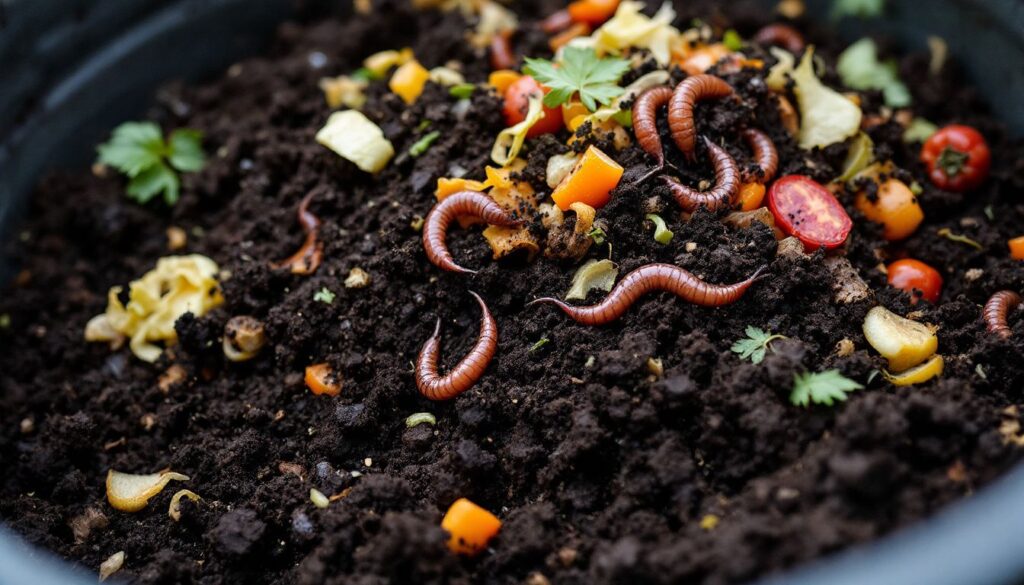Are you tired of buying costly plant foods and still getting poor results in your garden? Many of us have struggled with this same problem in our gardens and found that vermicompost can be used as a perfect solution for healthy plants without breaking the bank.
Worm-made compost adds over 60 minerals to your soil while helping plants grow up to 30% bigger than with store-bought fertilizers. This blog will show you ten easy ways to use this black gold in your garden, home, and even farm.
Get ready to transform your growing game!
What is Vermicompost?

Vermicompost is a rich, dark soil made by earthworms that break down organic waste. We use special worms like red wigglers, European nightcrawlers, and local species such as _Lampito mauritii_ to create this natural fertiliser.
The process turns kitchen scraps and yard waste into valuable plant food. The final product, called vermicast, contains many water-soluble nutrients that plants love.
Vermicomposting transforms waste into wealth for your garden, creating living soil that plants thrive in.
This method works faster than regular composting and gives better results. The finished vermicompost has lower salinity and a neutral pH level, making it safe for all plants. It serves as both a soil conditioner and fertiliser, improving soil structure while feeding plants.
Unlike chemical options, vermicompost has fewer contaminants and helps build healthy soil for the long term.
Benefits of Vermicompost
Vermicompost offers amazing benefits for your garden and the planet. We’ve seen gardens thrive with this natural soil booster that plants simply love.
Enhances soil health
We find vermicompost truly amazing for soil health improvement. It creates better soil structure through the ‘drilosphere’ effect, which helps roots grow more easily. Our garden soil becomes more alive with helpful microbes that turn waste into plant food.
The earthworm castings in vermicompost boost soil quality by adding organic matter that holds water longer. Plants can drink when they need to, even during dry spells. The soil stays loose and full of air, so roots can breathe well.
Good soil means happy plants!
Soil with vermicompost holds more water and air than plain dirt. This matters because plants need both to grow strong. The rich microbial life in vermicompost speeds up nutrient cycling, making food ready for plants to use right away.
Our next topic will show how these soil improvements lead to better nutrient availability for your garden plants.
Boosts nutrient availability
Beyond just making soil healthier, vermicompost gives plants the nutrients they need to grow strong. Our tests show that vermicast contains many water-soluble nutrients that plants can use right away.
These special nutrients help plants take up food more easily from the soil. The rich mix of enzymes like proteases, amylases, urease, and phosphatase break down organic matter faster.
Vermicompost doesn’t just feed the soil – it creates a living buffet of nutrients plants can access immediately.
The microbial life in vermicompost plays a key role in plant nutrition. These tiny helpers turn soil into a busy workshop of nutrient cycling. Plants grown in soil with vermicompost show better growth because they can get more food with less effort.
This makes vermicompost a top choice for organic fertilizers in sustainable agriculture systems.
Improves water retention
Vermicompost works wonders for soil’s ability to hold water. The worm mucus found in this natural amendment creates a special coating that stops nutrients from washing away during watering.
We’ve seen gardens using vermicompost need less frequent watering because the soil keeps moisture longer. Plants grow stronger with this steady water supply, even during dry spells.
Our garden beds with vermicompost show much better water holding capacity than regular soil. The improved soil structure lets roots access moisture more easily while reducing runoff and water waste.
This increased water efficiency means you’ll save time and money on watering costs. Next, let’s explore how vermicompost serves as an excellent organic fertiliser for your plants.
Ways Vermicompost Can Be Used
Vermicompost offers many uses that can transform your garden and help the planet. Let’s explore how this worm-created magic can work for you in your garden, home, and beyond.
As a soil conditioner
Vermicompost works wonders as a soil conditioner for any garden or farm. We mix 1 inch of this rich worm casting material into 6 inches of soil to create the perfect growing environment.
This organic soil amendment breaks up clay soils and helps sandy soils hold more water. The humus in vermicompost improves soil structure and creates better air flow for plant roots.
Our gardens thrive with this eco-friendly soil conditioner because it boosts helpful soil microbes. These tiny organisms make nutrients more available to plants and build healthier soil over time.
The biofertilizer aspect of vermicompost means plants get a steady supply of food rather than quick bursts from chemical products. Soil enrichment happens naturally as the worm castings blend with your existing dirt to form the ideal plant home.
As an organic fertiliser
Vermicompost works as a perfect organic fertiliser for all types of plants. We use it to feed our gardens with its rich blend of nutrients that plants love. It contains 1-7% nitrogen, 0.5-1.5% P₂O₅, and 1-2% K₂O, making it a balanced food source for plant growth.
This natural plant food releases nutrients slowly, which helps plants get steady nutrition over time.
The best fertiliser for any soil is a gardener’s shadow. – Ancient proverb
Our plants respond well to this soil enrichment option because it mimics nature’s own way of feeding plants. The worm castings in vermicompost boost soil health while giving plants what they need to grow strong.
Many gardeners switch to this eco-friendly gardening choice to avoid harsh chemicals. The soil amendment qualities also help improve the structure of poor soils.
For seed-starting mixes
Beyond its role as an organic fertiliser, vermicompost makes a perfect base for seed-starting mixes. We mix one part vermicompost with three parts regular potting soil to create a nutrient-rich environment for new seeds.
This special mix helps seeds sprout faster and grow stronger in their early stages. We place about 1 inch of vermicompost in furrows before sowing seeds to give them the best start.
The worm castings in the mix boost soil fertility while adding helpful microbes that protect tiny seedlings from disease. Young plants grown in vermicompost-enriched soil develop stronger roots and show more vigorous growth than those in plain soil.
As a top dressing for plants
Moving from seed-starting mixes, we now use vermicompost as a top dressing for established plants. This method works wonders for plant health without disturbing roots. We simply spread a 1-inch layer of nutrient-rich compost under the plant canopy.
The organic fertiliser slowly releases nutrients each time we water our plants.
Top dressing with vermicompost acts as a natural soil booster that improves nutrient uptake. Plants grow stronger with this ecological plant food right at their base. The sustainable gardening aid helps feed plants while adding valuable soil amendments.
Many gardeners notice greener leaves and more blooms after applying this garden mulch to their prized plants.
In compost tea preparation
Beyond top dressing, we make liquid gold from our vermicompost through compost tea. This simple process involves steeping vermicompost in water to create a nutrient-rich brew for plants.
We add one part vermicompost to five parts water and let it sit for 24 hours. The magic happens as beneficial enzymes and nitrogen-fixing bacteria from the vermiwash transfer into the water.
Our plants love this tea! We spray it directly on leaves or pour it around roots for quick nutrient uptake. The tea boosts microbial activity in soil while feeding plants at the same time.
Many organic farmers use this method to stretch their worm castings further. The tea works well for all plants, from tiny seedlings to mature fruit trees. Each batch brings life to soil and helps create sustainable, nutrient-rich growing spaces.
For improving houseplant soil
After brewing compost tea, we can focus on another great use for vermicompost – improving houseplant soil. Our indoor plants thrive with the addition of worm castings to their potting mix.
We mix 25-33% vermicompost by volume into our houseplant soil to create a nutrient-rich environment. This natural soil enrichment works wonders for struggling plants that need a boost.
The microbial activity in vermicompost helps break down nutrients into forms plants can easily use.
Houseplants benefit greatly from this soil conditioner because it boosts both nutrient availability and water retention. We notice our plants need less frequent watering since vermicompost holds moisture better than regular potting soil.
The worm castings also provide slow-release plant nutrition that feeds our indoor greenery for months. Many houseplants show greener leaves and stronger growth within weeks of getting this sustainable gardening treatment.
Vermicompost in Gardening
Vermicompost works wonders in vegetable gardens and flower beds. We use it to boost plant growth and improve soil structure across our garden spaces.
Vegetable gardens
Vegetable gardens thrive with the addition of vermicompost. We mix this nutrient-rich material into our garden beds to boost soil fertility and improve plant health. A simple layer of 1 inch works wonders as mulch around growing vegetables.
Our tomatoes, peppers, and leafy greens show better germination rates and higher yields with regular applications.
The worm castings in vermicompost feed garden plants slowly over time, unlike chemical fertilisers that wash away quickly. Our organic gardening practices rely on this sustainable soil amendment.
The microbial activity in vermicompost helps break down existing soil nutrients, making them more available to plant roots. Garden mulch made from vermicompost also helps retain moisture during dry spells.
Flower beds
While vermicompost works wonders in vegetable gardens, it also creates stunning flower beds. Our flower beds thrive with a layer of vermicompost mixed into the soil. We add about 2-3 inches of this dark, crumbly material to our existing garden soil before planting seasonal blooms.
The rich nutrients feed our flowers throughout their growing season, resulting in more vibrant colours and stronger stems.
Vermicompost improves root development in our flowering plants, helping them establish quickly. We use it as a top dressing around established perennials by gently working it into the top layer of soil.
This practice feeds the beneficial soil microorganisms that support plant health. Our roses, dahlias, and marigolds show amazing growth with this natural fertiliser. The worm castings in vermicompost also contain plant hormones that boost flower production and extend blooming periods.
Vermicompost in Farming
Vermicompost has changed farming across the UK by boosting crop yields naturally. We’ve seen farmers switch to this organic method as part of their sustainable growing practices.
Organic farming practices
We use vermicompost as a key part of organic farming practices. It helps farmers grow crops without harmful chemicals. Our approach to organic agriculture puts soil health first, and vermicompost plays a vital role in this process.
The earthworm-created compost boosts soil fertility naturally. It works faster than regular composting methods, which saves time for farmers. The end product has lower salt levels and a neutral pH, making it safe for all plants.
Many organic farmers mix vermicompost into their fields before planting. This simple step improves crop growth and health. Sustainable farming needs good soil, and vermicompost delivers just that.
Enhancing crop yields
Organic farming practices blend perfectly with our goal to boost crop yields through vermicompost. Farmers who add vermicompost to their fields see amazing results in how much food they can grow.
Our tests show that plants take in more nutrients from soil mixed with vermicompost. The tiny life forms in this rich matter help plants grow stronger roots and sprout better. Many farms report bigger harvests after they start using worm castings in their fields.
The magic happens because vermicompost feeds soil microbes that work with plant roots. These helpful bugs break down more food for crops to eat. Plants grow faster and produce more when they get the right mix of nutrients that vermicompost offers.
Vermicompost for Environmental Sustainability
Vermicompost helps reduce landfill waste by turning kitchen scraps into valuable soil. We create a healthier planet when we recycle organic matter through worm bins instead of sending it to dumps.
Reducing organic waste
We can cut down on organic waste through vermicomposting. This simple process turns kitchen scraps and yard waste into rich compost instead of sending it to landfills. Our planet benefits greatly as vermicomposting reduces greenhouse gas emissions like methane and nitric oxide.
These harmful gases trap heat in our atmosphere and speed up climate change.
Organic waste management becomes easy with worm composting. Food scraps make up nearly one-third of what we throw away. By recycling these materials, we create sustainable waste disposal systems in our homes and communities.
Environmental conservation starts with small steps like composting. The worms work hard to break down waste, leaving behind nutrient-rich soil that helps plants grow without chemical fertilisers.
Supporting eco-friendly practices
Vermicompost helps us build a greener world by turning waste into wealth. Our team has seen this eco-friendly practice grow in many places, from hospitals to malls across North America.
The waste that would fill landfills now feeds worms that make rich soil. This circular economy approach cuts down waste while making farms more fertile.
The “Godhan Nyay Yojana” launched by the Chhattisgarh government on 20 July 2020 shows how vermicomposting supports environmental stewardship. This plan turns cow dung and other organic waste into valuable compost.
Such green practices create jobs, reduce the need for chemical fertilisers, and help farmers grow better crops. Our planet needs these sustainable solutions to fight soil loss and climate change.
Conclusion
Worm castings offer a simple yet powerful way to boost your garden’s health. You can mix them with soil, brew them as tea, or use them to start seeds. These magic dirt makers help plants grow strong while cutting down waste.
Our planet needs more earth-friendly choices like worm composting – it’s good for your plants and good for the world.




